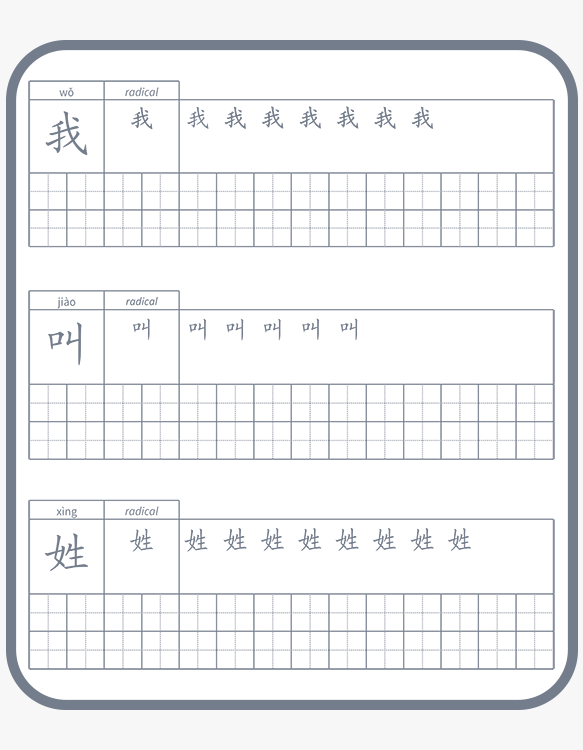Level 1 Lesson 1.2 – Characters: 住家北京所校间宿舍
How To Write Chinese Characters & Chinese Radicals
In this video lesson we'll learn Chinese Characters zhu, jia, bei, jing, xiao, suo, su, she and jian. We'll learn how to write these characters with a better understanding of their construction. And we'll also learn the Chinese Radicals used in these characters.
- Chinese Radicals: 匕 亠 门
- Chinese Characters: 住 家 北 京 所 校 宿 舍 间
DOWNLOADS
CHINESE RADICALS
| HSK | RADICAL | PINYIN | ENGLISH |
|---|---|---|---|
| 1 | 匕 ① | bǐ | spoon; knife |
| 1 | 亠 ② | tóu | - |
| 1 | 门 | mén | door |
NOTES: ① 匕 means "spoon" as a Radical and "knife" as an independent character. ② There is no agreement on the meaning of 亠 and characters that have 亠 as their Radical don't have a commonly shared meaning, so we can say the meaning of 亠 is "undecided".
CHINESE CHARACTERS
| HSK | CHARACTER | PINYIN | ENGLISH |
|---|---|---|---|
| 1 | 住 | zhù | to live |
| 1 | 家 | jiā | home; family |
| 3 | 北 | běi | north |
| 4 | 京 | jīng | capital |
| 1 | 校 | xiào | school |
| 2 | 所 | suǒ | measure word for institutions |
| 5 | 宿 | sù | to spend the night |
| 5 | 舍 | shè | house |
| 1 | 间 | jiān | measure word for rooms |
8 Comments
Leave a Reply
You must be logged in to post a comment.

what would be the difference between 刀 and 匕? both mean knife as characters by themselves, are they just synonims or is there any difference regarding their use?
I was wondering that too.
This is the best learning resource and I tried dozens!
Hi, can anyone explain how to use the different character 家and 舍? I’m slightly confused about it.
Thank you for sharing.
M
I, for my part, am glad that there are no traditional characters. I think it’d we be a bit confusing and I prefer to learn the simplified characters well instead of trying both and mixing them together. So if you consider to give support for traditional characters I’d appreciate a button in the menu to choose which types I want to see.
I really appreciate that you name the measure words for each noun. I have already learnt all the vocabulary for HSK 1 and 2 and asked a Chinese friend for all the measure words because they are normally not listed in the vocabulary lists to find in the internet. So please go on and tell us all the measure words for future nouns! I appreciate that a lot!
Yellow bridge is a great dictionary to look for measure words but for a beginner it’s often difficult to choose the right one to learn because many nouns can have multiple measure words (like 本书 for a single book, 部书 for a volume). You said 所 is used for institutions but there is also 家, for instance 一家医院. Do you have any rule which one is to use?
For me it’s not that helpful to learn the radicals for the characters. Sometime I even confuse parts of the characters when drawing. For now I am practicing them separately to your lessons with an own self-programmed vocabulary learning program and dozens of times drawing them by hand too. I’m still looking for ways to memorize characters better. Any ideas?
Dear Lili and all the others in the community,
Maybe one further comment to make it clear what kind of problems I have when I am learning characters. I don’t have this problems usually when I am typing characters with the keyboard because I can very “safely” choose the right one out of a choice. But when I am writing the characters by my hand, then I have no choice to choose from and need to remember every stroke all by myself.
Typical mistakes I tend to do when writing characters by hand is something like 名子 (wrong for míngzi, instead of 名字) or 汉话 (wrong for Hànyǔ, instead of 汉语). I think it’s obvious why I am doing this kind of mistakes: Even though I can divide 字 in it’s radicals 宀 (mián = roof) and 子 (zǐ = child) when seeing the character, I have no really good strategy to remember if the word “name = míngzi” comes along with the character 子 with or without “roof”. Similar mistake with 语 and 话. I can easily divide both characters in their components and if I have a short glance at them I can easily draw them, knowing their components, without any further look at them. But still, sometimes it happens that I cannot remember anymore which radicals a character contains – and the knowledge to recognize radicals itself does not really help me to avoid those kind of confusion.
Maybe there is just no better way to avoid mistakes like that than repeating over and over again but if anyone has a better strategy to remember characters then I’d be glad for any kind of suggestion.
Finally, I want to add to add that I enjoy your classes and to apologise for my mistakes in English writing as I am not a native English speaker.
Regards,
Michael
Where can i get all Chinese radicals? How many radicals exists in Chinese?
Thanks for the inquiry. I might make a list of all common Chinese Radicals and include it in our premium content in the future. Please stay tuned.